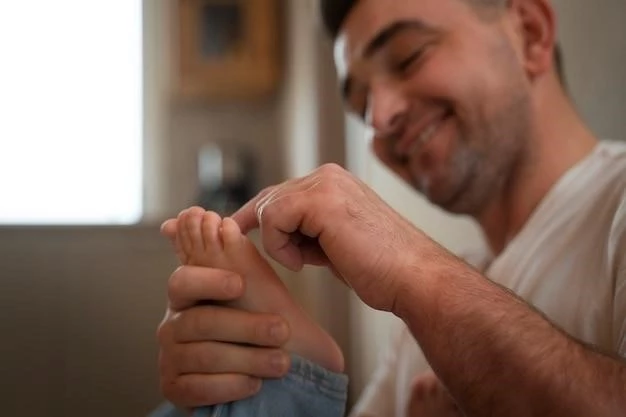Understanding Cramer-Niederdellmann Syndrome
Below is an outline of what will be covered in the article for a comprehensive understanding of Cramer-Niederdellmann Syndrome⁚
- Causes of Cramer-Niederdellmann Syndrome
- Symptoms of Cramer-Niederdellmann Syndrome
- Diagnosis and Testing for Cramer-Niederdellmann Syndrome
- Treatment Options for Cramer-Niederdellmann Syndrome
- Prognosis and Life Expectancy with Cramer-Niederdellmann Syndrome
- Research and Developments in Cramer-Niederdellmann Syndrome
- Support and Resources for Individuals with Cramer-Niederdellmann Syndrome
- Coping Strategies for Families Affected by Cramer-Niederdellmann Syndrome
Causes of Cramer-Niederdellmann Syndrome
Understanding the causes of Cramer-Niederdellmann Syndrome can provide insight into this rare condition. While the specific cause is not yet fully understood‚ it is believed to be genetic in nature. Mutations in certain genes may play a role in the development of this syndrome‚ affecting how the muscles and connective tissues develop in affected individuals.
Research is ongoing to identify the exact genetic factors involved in Cramer-Niederdellmann Syndrome‚ which can help in better understanding the condition and potentially lead to improved diagnostic methods and targeted treatments in the future. Genetic counseling may be recommended for families with a history of the syndrome to assess the risk of passing it on to future generations.
It is essential to consult with healthcare professionals specializing in genetic disorders for a thorough evaluation and advice on managing the genetic aspects of Cramer-Niederdellmann Syndrome. Staying informed and proactive in genetic testing and counseling can aid in navigating the complexities of this syndrome and its implications for individuals and families.
Symptoms of Cramer-Niederdellmann Syndrome
Recognizing the symptoms of Cramer-Niederdellmann Syndrome is crucial for early detection and management. Individuals with this syndrome may experience a range of symptoms affecting the muscles and connective tissues. Common symptoms include muscle weakness‚ joint hypermobility‚ scoliosis (sideways curvature of the spine)‚ and delayed motor skills development.
Moreover‚ individuals with Cramer-Niederdellmann Syndrome may exhibit facial features such as a long face‚ high forehead‚ and a thin upper lip. Some may also have vision or hearing impairments‚ as well as intellectual disabilities. It is essential to consult with healthcare professionals specializing in rare genetic disorders to confirm the diagnosis based on the observed symptoms and genetic testing results.
Early intervention and multidisciplinary care involving physical therapists‚ occupational therapists‚ and other specialists can help manage the symptoms and improve the quality of life for individuals with Cramer-Niederdellmann Syndrome. Regular monitoring of symptoms and addressing any emerging issues promptly can contribute to better long-term outcomes and overall well-being.
Diagnosis and Testing for Cramer-Niederdellmann Syndrome
Diagnosing Cramer-Niederdellmann Syndrome involves a comprehensive evaluation by a team of medical specialists familiar with rare genetic disorders. The diagnosis is typically based on a thorough physical examination‚ detailed medical history‚ and genetic testing. Advanced imaging studies like MRI or CT scans may be used to assess muscle and skeletal abnormalities.
Genetic testing plays a crucial role in confirming the presence of specific gene mutations associated with Cramer-Niederdellmann Syndrome. Testing may involve analyzing DNA samples to identify the genetic markers linked to the syndrome. It is essential to work closely with genetics professionals to interpret test results accurately and understand the implications for the individual and their family.
Early and accurate diagnosis can guide healthcare providers in developing personalized care plans tailored to manage the symptoms and address any related health issues effectively. Timely genetic testing can also help in assessing the risk of the syndrome in other family members and facilitate informed decision-making about family planning options.
Treatment Options for Cramer-Niederdellmann Syndrome
Managing Cramer-Niederdellmann Syndrome involves a multidisciplinary approach focused on addressing the specific symptoms and improving the individual’s quality of life. Treatment options may include physical therapy to strengthen muscles‚ improve mobility‚ and enhance coordination. Occupational therapy can help with daily tasks and skills development.
Orthopedic interventions such as bracing or surgery may be necessary to address spine curvature (scoliosis) or joint issues. Speech and language therapy can assist individuals with communication challenges‚ while special education programs and behavioral therapies may support cognitive development and social skills.
Regular medical monitoring is essential to track the progression of symptoms and adjust treatment plans accordingly. Genetic counseling can provide families with information on the genetic aspects of the syndrome and guide decision-making regarding future pregnancies or family planning.
Collaborating with a team of healthcare professionals experienced in rare genetic conditions can ensure comprehensive care and support for individuals with Cramer-Niederdellmann Syndrome. By combining various therapeutic modalities and personalized interventions‚ tailored treatment plans can be developed to address the unique needs of each individual affected by the syndrome.
Prognosis and Life Expectancy with Cramer-Niederdellmann Syndrome
Understanding the prognosis and life expectancy of individuals with Cramer-Niederdellmann Syndrome is complex due to the variability in symptom presentation and disease progression. The prognosis can vary widely depending on the severity of symptoms and the individual’s response to treatment interventions.
While Cramer-Niederdellmann Syndrome is a lifelong condition‚ early diagnosis and comprehensive care can significantly impact the individual’s quality of life and overall health outcomes. Proactive management of symptoms‚ regular medical monitoring‚ and access to tailored interventions can help optimize functioning and well-being.
It is essential for individuals and families affected by Cramer-Niederdellmann Syndrome to work closely with healthcare professionals to develop personalized care plans and support networks. Engaging in rehabilitation programs‚ educational opportunities‚ and community resources can enhance the individual’s autonomy and social integration.

Research and advancements in medical treatments and supportive therapies continue to evolve‚ offering hope for improved outcomes and quality of life for individuals with Cramer-Niederdellmann Syndrome. By staying informed‚ seeking ongoing medical guidance‚ and fostering a supportive environment‚ individuals can navigate the challenges of this syndrome with resilience and strength.
Research and Developments in Cramer-Niederdellmann Syndrome
Ongoing research and developments in Cramer-Niederdellmann Syndrome aim to deepen our understanding of the underlying genetic mechanisms and explore novel treatment approaches. Researchers are working to identify specific gene mutations associated with the syndrome and their impact on muscle and connective tissue development.
Advancements in genetic testing technologies have facilitated more accurate diagnosis and early intervention strategies. Clinical studies focusing on personalized therapies and targeted interventions hold promise for improving the management of symptoms and enhancing the quality of life for individuals with Cramer-Niederdellmann Syndrome.
Collaboration between healthcare professionals‚ researchers‚ and advocacy organizations plays a crucial role in driving progress in the field of rare genetic disorders. By supporting research initiatives‚ participating in clinical trials‚ and sharing knowledge‚ the medical community can advance our knowledge of Cramer-Niederdellmann Syndrome and pave the way for innovative treatment options in the future.
Staying informed about current research endeavors and actively engaging with healthcare providers can empower individuals and families affected by Cramer-Niederdellmann Syndrome to access cutting-edge therapies and contribute to ongoing advancements in the field. By remaining hopeful and proactive‚ we can collectively strive towards a better future for those impacted by this rare genetic condition.
Support and Resources for Individuals with Cramer-Niederdellmann Syndrome
Individuals with Cramer-Niederdellmann Syndrome and their families can benefit from a wide range of support services and resources to navigate the challenges associated with the condition; Connecting with patient advocacy groups‚ such as rare disease organizations and genetic disorder support networks‚ can provide valuable information and emotional support.
Seeking out specialized healthcare providers experienced in rare genetic conditions can ensure comprehensive care and management tailored to the individual’s specific needs. Rehabilitation services‚ including physical therapy‚ speech therapy‚ and occupational therapy‚ can help enhance mobility‚ communication skills‚ and daily living activities.
Education and vocational training programs tailored to the individual’s abilities can promote independence and social integration. Accessing community resources‚ disability services‚ and financial assistance programs can provide additional support for individuals with Cramer-Niederdellmann Syndrome and their families.
Engaging in peer support groups‚ online forums‚ and counseling services can offer emotional support and the opportunity to connect with others facing similar challenges. By building a strong support network and staying informed about available resources‚ individuals with Cramer-Niederdellmann Syndrome can enhance their quality of life and well-being on their unique journey.
Coping Strategies for Families Affected by Cramer-Niederdellmann Syndrome
Families facing the challenges of Cramer-Niederdellmann Syndrome can benefit from adopting coping strategies to navigate the complexities of the condition and promote resilience. Building a strong support network composed of healthcare providers‚ family‚ friends‚ and support groups can provide emotional support and practical assistance.
Open communication within the family unit is essential to address concerns‚ share experiences‚ and collaboratively address the needs of the individual with Cramer-Niederdellmann Syndrome. Establishing routines‚ setting realistic goals‚ and celebrating small achievements can foster a sense of normalcy and accomplishment within the family dynamic.
Self-care practices for family members‚ including stress management techniques‚ seeking respite care‚ and prioritizing mental and physical well-being‚ are crucial for sustaining the caregiver’s health and ability to provide ongoing support. Educating oneself about the syndrome‚ connecting with other families with similar experiences‚ and staying informed about available resources can empower families in their caregiving journey.
Engaging in family activities‚ maintaining a positive outlook‚ and approaching challenges with patience and understanding can contribute to a supportive and nurturing environment for the individual with Cramer-Niederdellmann Syndrome. By embracing teamwork‚ resilience‚ and adaptability‚ families can enhance their coping mechanisms and navigate the complexities of caring for a loved one with this rare genetic condition.
